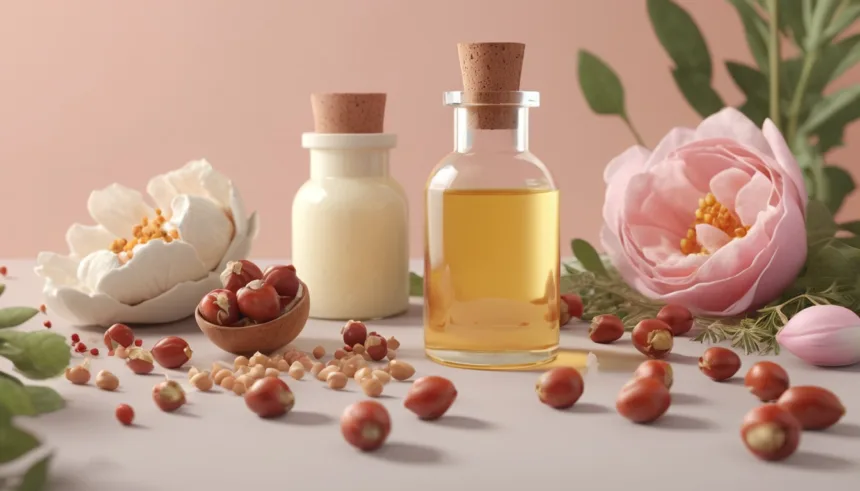While I’m not a big “routine” person, I make sure to follow a skincare routine religiously. I look forward to this self-care ritual after a stressful work day. But it wasn’t until a particularly memorable trip to the countryside that I truly understood the significance of using natural skincare. There I was, soaking up the sun, feeling the wind in my hair. And you know what hit me? Nature’s the ultimate skincare guru! It’s got this amazing knack for keeping your skin happy and hydrated, the all-natural way.
Skincare not just about looking good – it’s about giving our skin the TLC it totally deserves. I mean, think about it: our skin’s like this huge, amazing organ that’s always got our back, literally! So, when we’re on the hunt for that glow-up, going natural with a moisturizer for the face sounds like the perfect plan, right?
So, what ingredients should be in my moisturizer, you ask? That’s precisely what we’ll delve into – the world of natural moisturizer for face and the key ingredients that make them truly transformative. From lush botanical extracts to nourishing oils sourced from the earth, let’s unlock the secrets to radiant, supple skin, one natural ingredient at a time.
Table of Contents
Understanding Moisturizers
So as I was knee-deep into my skincare journey, I realized that moisturizers are more than just fancy stuff in cute packaging—they’re like MVPs that keep our skin supple and hydrated. But here’s the real scoop: finding the perfect one for your skin type? It’s all about that personalized pampering to keep your skin feeling its absolute best!
Definition and Purpose of Moisturizers
- Hydration Boost: Moisturizers are like a tall glass of water for your skin, hydrating and restoring moisture balance.
- Barrier Protection: They form a protective layer on the skin’s surface, locking in moisture and shielding against environmental aggressors.
- Texture Smoothening: Moisturizers help in smoothing out rough patches, leaving behind a velvety-soft texture.
- Enhanced Radiance: By hydrating the skin, moisturizers promote a healthy glow and youthful appearance.
Pro Tip: Look for moisturizers with lightweight formulas for daytime use and richer textures for nighttime hydration. This ensures your skin gets the right level of nourishment round the clock.
Importance of Choosing the Right Moisturizer for Your Skin Type
- One Size Doesn’t Fit All: Just like a bespoke suit, your moisturizer should be tailored to your skin’s unique needs.
- Dry Skin: Opt for creamy, emollient-rich moisturizers packed with hydrating ingredients like hyaluronic acid and shea butter.
- Oily or Acne-Prone Skin: Look for oil-free, non-comedogenic formulas that won’t clog pores, and ingredients like niacinamide to regulate sebum production.
- Sensitive Skin: Fragrance-free, hypoallergenic moisturizers with soothing ingredients like chamomile and oat extract are gentle on sensitive skin.
Pro Tip: Patch-test new moisturizers on a small area of your skin before full application to avoid potential irritation or allergic reactions.
The Benefits of Natural Moisturizers

As someone who’s obsessed with keeping it au naturel, I’ve totally fallen head over heels for natural moisturizer for face. And trust me, once you dive into the world of natural ingredients, there’s no turning back. It’s like unlocking this whole new level of glow for your face! So, let’s dive in and chat about why going natural is the ultimate game-changer.
Why Natural Moisturizer For Face Takes a Lead Over Synthetic Ones:
- Gentle Formulation: Natural moisturizers are free from harsh chemicals and synthetic fragrances, making them gentle on even the most sensitive skin types.
- Avoiding Harmful Additives: By steering clear of parabens, sulfates, and other potentially harmful additives, natural moisturizer for face minimizes the risk of adverse reactions and long-term skin damage.
- Environmental Impact: Choosing natural skincare supports sustainable and eco-friendly practices, reducing our carbon footprint and promoting a healthier planet.
Pro Tip: Check product labels for certifications like “organic” and “cruelty-free” to ensure you’re getting a truly natural moisturizer for face with minimal environmental impact.
Advantages of Using Natural Moisturizer For Face
- Nutrient-Rich Formulas: Natural moisturizers harness the power of botanical extracts, vitamins, and minerals to nourish and rejuvenate the skin from within.
- Balanced Hydration: Unlike synthetic moisturizers that may cause imbalance or over-hydration, natural ingredients work in harmony with the skin’s natural moisture barrier, providing optimal hydration without clogging pores.
- Reduced Irritation: With fewer potential irritants, a natural moisturizer for face is less likely to cause inflammation or allergic reactions, making it ideal for those with sensitive or reactive skin.
Pro Tip: Look for multitasking natural ingredients like rosehip oil, which not only hydrates but also brightens, firms, and evens out skin tone for a radiant complexion.
How Natural Moisturizers Can Address Various Skin Concerns Effectively
- Anti-Aging Properties: A natural moisturizer for face is rich in antioxidants and essential fatty acids, combating free radical damage and minimizing the appearance of fine lines and wrinkles.
- Acne Management: Many natural ingredients possess anti-inflammatory and antimicrobial properties, making them effective in controlling acne breakouts and promoting clearer, blemish-free skin.
- Soothing and Healing: Natural moisturizers like aloe vera and calendula have soothing and healing properties, calming irritation, reducing redness, and accelerating the skin’s healing process.
Pro Tip: Customize your skincare routine by layering natural serums or facial oils under your moisturizer to target specific skin concerns, such as hydration, brightening, or anti-aging.
Embracing natural moisturizer for face in particular isn’t just a skincare choice—it’s a lifestyle commitment to nurturing your skin with the purest, most effective ingredients nature has to offer.
Key Ingredients to Look For

I’m all about that glow, and I’ve learned that the key to unlocking it is in picking the right ingredients. Seriously, it’s like assembling the dream team for your face! So, grab your magnifying glass, because we’re diving deep into the world of powerhouse ingredients!
Hydrating Ingredients
- Hyaluronic Acid: This hydrating powerhouse has a remarkable ability to attract and retain moisture, plumping up the skin and reducing the appearance of fine lines and wrinkles.
- Glycerine: Known for its humectant properties, glycerine draws moisture from the environment into the skin, keeping it soft, supple, and well-hydrated.
- Aloe Vera: Nature’s gift to parched skin, aloe vera is a soothing and hydrating ingredient that calms inflammation and replenishes lost moisture.
Pro Tip: Layer products containing hyaluronic acid under your moisturizer to lock in moisture and maximize hydration throughout the day.
Nourishing Oils
- Jojoba Oil: With a composition similar to the skin’s natural sebum, jojoba oil balances oil production, nourishes the skin, and helps maintain a healthy moisture barrier.
- Argan Oil: Packed with antioxidants, essential fatty acids, and vitamin E, argan oil rejuvenates the skin, leaving it smooth, soft, and radiant.
- Coconut Oil: Rich in medium-chain fatty acids, coconut oil deeply moisturizes the skin, repairs damaged skin barrier, and imparts a dewy glow.
Pro Tip: Mix a drop of your favourite facial oil with your natural moisturizer for face to get that extra boost of hydration and nutrients.
Antioxidants
- Vitamin C: This potent antioxidant brightens the complexion, stimulates collagen production, and protects the skin from oxidative stress caused by environmental pollutants.
- Vitamin E: With its anti-inflammatory and healing properties, vitamin E repairs and nourishes the skin, reducing the appearance of scars and promoting a youthful appearance.
- Green Tea Extract: Bursting with polyphenols, green tea extract neutralizes free radicals, soothes irritation, and slows down the signs of aging.
Pro Tip: Look for stabilized forms of vitamin C, such as ascorbic acid or magnesium ascorbyl phosphate, for maximum efficacy and stability.
Soothing Agents
- Chamomile: Popular for its calming and anti-inflammatory properties, chamomile soothes redness, irritation, and sensitivity, leaving the skin calm and comforted.
- Calendula: This botanical powerhouse possesses healing and anti-inflammatory benefits, making it ideal for soothing dry, irritated, or sun-damaged skin.
- Oat Extract: A natural emollient and anti-irritant, oat extract hydrates, softens, and protects the skin’s moisture barrier, making it perfect for sensitive or eczema-prone skin.
Pro Tip: Opt for fragrance-free formulations containing soothing agents to minimize the risk of irritation, especially for sensitive skin types.
By incorporating these key ingredients into your natural moisturizer for the face, you’ll not only hydrate and nourish your skin but also provide it with the essential nutrients and antioxidants it needs to thrive.
Ingredients to Avoid

As a skincare buff, I’ve learned that not all ingredients are created equal, and some can do more harm than good to our delicate facial skin. Let’s uncover the culprits lurking in our moisturizers and why it’s crucial to steer clear of them.
Explanation of Harmful Ingredients Commonly Found in Moisturizers
- Parabens: These synthetic preservatives are known to disrupt hormone function and have been linked to various health concerns, including breast cancer.
- Sulfates: Found in many cleansers and foaming agents, sulfates can strip the skin of its natural oils, leading to dryness, irritation, and increased skin sensitivity.
- Phthalates: Often hidden under the term “fragrance,” phthalates are plasticizers that can interfere with hormone regulation and may contribute to reproductive issues and developmental abnormalities.
Pro Tip: Check the ingredient list for words ending in “paraben,” “sulfate,” and “phthalate” to identify products containing these harmful additives.
Why Certain Synthetic Additives and Preservatives Should Be Avoided:
- Skin Irritation: Synthetic additives like artificial fragrances and colors can cause allergic reactions, irritation, and redness, particularly in individuals with sensitive skin.
- Environmental Impact: Many synthetic ingredients are non-biodegradable and can accumulate in the environment, posing a threat to aquatic life and ecosystems.
- Long-Term Health Risks: Some synthetic preservatives, such as formaldehyde-releasing agents and BHA/BHT, have been classified as potential carcinogens and may have adverse effects on our health over time.
Pro Tip: Choose products labeled “fragrance-free” or “unscented” to minimize the risk of irritation from synthetic fragrances.
For in-depth insight, check out our guide on choosing the best moisturizer for glowing skin.
How to Identify and Steer Clear of Potentially Harmful Ingredients:
- Read Labels Carefully: Take the time to analyze the ingredient list on your moisturizer’s packaging, paying attention to unfamiliar names or chemical compounds.
- Research: Educate yourself about common harmful ingredients and their potential health effects to make informed decisions about which products to avoid.
- Choose Clean Beauty Brands: Look for skincare brands that prioritize transparency and use natural, non-toxic ingredients in their formulations.
- Use Online Resources: Utilize online databases and apps that provide information on the safety and toxicity of skincare ingredients, empowering you to make safer choices for your skin and overall health.
Pro Tip: When in doubt, opt for products with shorter ingredient lists and recognizable, plant-based ingredients to minimize the risk of exposure to harmful additives.
By being vigilant about the ingredients we apply to our skin, we can protect ourselves from potential harm and promote healthier, more radiant skin in the long run.
DIY Natural Moisturizer For Face Recipes

If you’re anything like me, you love to play mixologist in your own kitchen, whipping up all sorts of luxurious ingredients for your skin. So, grab your mixing bowls and let’s dive into the world of DIY skincare!
Simple Recipes for Making Your Own Natural Moisturizers at Home:
- Hydrating Honey and Aloe Vera Moisturizer:
- Ingredients: Aloe vera gel, raw honey, coconut oil.
- Instructions: Mix equal parts aloe vera gel, raw honey, and melted coconut oil until well combined. Transfer to a clean jar and refrigerate for a cooling treat.
- Soothing Shea Butter and Lavender Balm:
- Ingredients: Shea butter, almond oil, lavender essential oil.
- Instructions: Melt shea butter and almond oil in a double boiler. Remove from heat and stir in a few drops of lavender essential oil. Pour into a container and let it solidify before use.
Ingredients and Step-by-Step Instructions for DIY Enthusiasts:
- Hydrating Cucumber and Green Tea Moisturizer:
- Ingredients: Fresh cucumber juice, brewed green tea, glycerin, vitamin E oil.
- Instructions: Combine equal parts cucumber juice and green tea. Add a few drops of glycerin and vitamin E oil. Mix well and store in a glass bottle for a refreshing pick-me-up.
- Nourishing Avocado and Olive Oil Cream:
- Ingredients: Ripe avocado, olive oil, beeswax, lavender essential oil.
- Instructions: Mash avocado and mix with olive oil. Melt beeswax in a double boiler and stir in the avocado mixture. Add a few drops of lavender essential oil for fragrance. Pour into jars and let it cool before sealing.
Cautionary Notes and Tips for Safe DIY Skincare Practices:
- Patch Test: Always patch-test homemade skincare products on a small area of your skin to check for any adverse reactions or allergies.
- Use Clean Tools: Ensure all utensils and containers used for DIY skincare are thoroughly cleaned and sanitized to prevent contamination.
- Storage: Store homemade natural moisturizer for face in an airtight container in a cool, dark place to prolong its shelf life and prevent spoilage.
- Experiment Safely: Feel free to customize DIY recipes to suit your skin’s needs, but be cautious when incorporating potent essential oils or active ingredients to avoid irritation.
Pro Tip: Consider investing in a few key ingredients like carrier oils, essential oils, and natural butters to expand your DIY skincare repertoire and tailor your formulations to your skin’s unique needs.
With these DIY recipes for natural moisturizer for face, you can treat your skin to the goodness of nature while indulging your inner skincare enthusiast. So, roll up your sleeves, gather your ingredients, and create great skincare right in your own home.
Wrapping Up
So, after our little chat, it’s clear that a natural moisturizer for face is like a lifesaver for your overall skincare. These moisturizers are gentle, they’re nourishing, and they give your skin that extra love without any of those nasty chemicals. Plus, by going natural, we’re basically throwing a big thank-you party for Mother Nature herself!
But here’s the real kicker: when it comes down to it, the ingredients are where the magic happens. Hyaluronic acid swooping in like a rescuer to hydrate, jojoba oil soothing your skin like warm jacuzzi, vitamin C giving you that radiant glow, and chamomile calming everything down like slow music.
So, before you dive into the sea of skincare choices, take a moment to ponder this: What ingredients do you want in your moisturizer?
FAQS
- Why should I opt for a natural moisturizer for face?
- Natural moisturizers are free from harsh chemicals and synthetic additives, making them gentle and safer for your delicate facial skin. They harness the power of botanical extracts and essential oils to nourish and hydrate your skin naturally.
- What ingredients should I look for in my moisturizer?
- Look for hydrating ingredients like hyaluronic acid and glycerin, nourishing oils such as jojoba oil and argan oil, antioxidants like vitamin C and vitamin E, and soothing agents like chamomile and aloe vera.
- Are there any harmful ingredients I should avoid in my moisturizer?
- Yes, it’s essential to steer clear of harmful ingredients like parabens, sulfates, and synthetic fragrances, which can irritate the skin and have potential long-term health risks. Opt for products labeled “fragrance-free” and free from harmful additives.
- Can I make my own natural moisturizer for face at home?
- Absolutely! There are many simple DIY recipes using natural ingredients like shea butter, coconut oil, and essential oils that you can whip up at home. Just be sure to patch-test new ingredients and follow proper storage guidelines.
- How can I ensure I’m making informed choices for healthier skin?
- Educate yourself about skincare ingredients, read product labels carefully, and do research on brands that prioritize transparency and sustainability. Consider consulting with a dermatologist for personalized skincare recommendations based on your skin type and concerns.



Leave a Reply